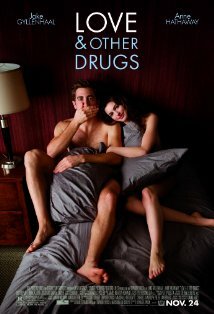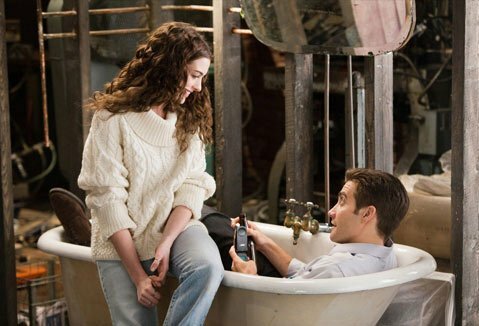Bouncing between a dramatic comedy, salacious romance, and Anne Hathaway’s 36C’s, Love and Other Drugs is almost poignant and occasionally charming.
Would-be doctor, Jamie Randall (Jake Gyllenhaal) rejects family expectations to live a shallow philandering lifestyle as a drug-pushing pharmaceutical salesman. Whilst enjoying his sordid sexy trysts he meets his sexual equal; the spirited Maggie Murdock (Anne Hathaway). Fiercely independent, Maggie prefers non-committal booty-calls, and rejects romantic prospects. Overcompensating for her ever approaching entrapment into dependence via Parkinson’s disease, she avoids real relationships. Jamie falls for the hesitant Maggie, and gradually, her for him.
Gyllenhaal brings a depth and maturity to the role of Randall, a suave salesman and lothario type. His transformation from womaniser to devoted monogamist is believable, if not compelling. The film’s many sex scenes provide Gyllenhaal ample opportunity to showcase his chiseled physique – and in particular, his immaculate rear end.
Hathaway is entertaining as the feisty and strong-willed Maggie. She is charming and fun, but also fragile and tormented in the wake of her frightening condition. Hathaway continues to chip away at her sweet and unsullied typecasting (a la The Princess Diaries, The Devil Wears Prada) through meatier roles, including her Oscar nominated turn in 2008’s Rachel Getting Married. She has a flair for portraying reckless abandon in these strong, spunky, albeit vulnerable characters. The supporting cast is mostly capable, including veterans Oliver Platt and Hank Azaria. Silver screen newcomer Josh Gad, is responsible for much of the film’s humour, as Randall’s socially inept and sex-obsessed younger brother. You can’t help but see him as a graduate of the Zach Galifianakis school of comedy. Yet, where Galifianakis endears us with his characters’ obscurities, Gad merely annoys.
Love and Other Drugs is a difficult film to feel passionately about. All the elements are here; a charismatic lead duo, a dramatic, based-on-true-events story and a competent director (Edward Zwick; Courage Under Fire, The Last Samurai), yet the end result falls flat. Only the numerous, explicit sexual encounters bring something new to the tired romantic dramedy genre. This no-holds-barred approach to getting in the nuddy and “doing the dirty” adds some grit, in a usually cautious Hollywood market, but it is not enough to save the film from its predictable, schmaltzy ending. The film’s greatest downfall lies in its portrayal of Maggie’s struggle with Parkinson’s disease (which is not a spoiler considering it is revealed early in the film). What should be heart-wrenching descends into eye-rolling melodrama. A scene where Hathaway misses her medication and fumbles about is particularly awkward; it plays out like an acting class. Still, the relationship at the centre of this all may not be anything fresh, but it is tender and loving, and many will find it a rewarding two hour escape.
The love is warm and the drugs are plentiful, but Love and Other Drugs fails to administer the correct dosage. The likeable, charismatic leads give their best, even willing to flaunt their bits and pieces in an effort to provide the film a much needed edge. If only the entire film-making process was injected with this type of risk-taking flair.








![Rio [2011] (Review) Rio [2011] (Review)](/wp-content/uploads/rio061-e1301443979946-150x150.jpg)








